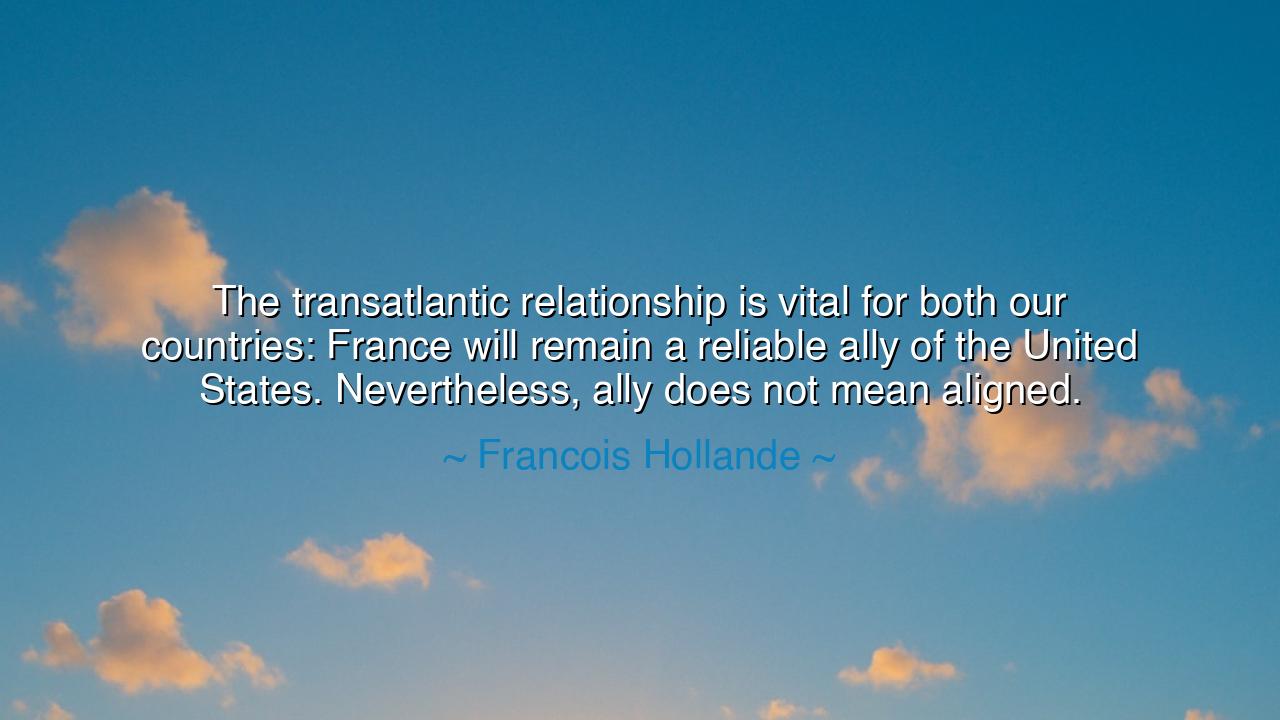
The transatlantic relationship is vital for both our countries:
The transatlantic relationship is vital for both our countries: France will remain a reliable ally of the United States. Nevertheless, ally does not mean aligned.






The words of François Hollande—“The transatlantic relationship is vital for both our countries: France will remain a reliable ally of the United States. Nevertheless, ally does not mean aligned”—resound with the wisdom of balance, a teaching that the ancients themselves would have treasured. They remind us that loyalty between nations, as between people, is not slavery but choice, not submission but partnership.
The ancients knew that every relationship built upon strength must also honor independence. To be an ally was to stand beside another in moments of trial, to offer shield and sword when danger threatened, yet without forsaking the freedom to choose one’s own path. Thus, Hollande’s words proclaim that true alliance is forged not in blind obedience but in mutual respect, where each sovereign voice remains its own.
The distinction between ally and aligned is profound. To be aligned is to walk in lockstep, to sacrifice judgment and will to the course of another. But to be an ally is to stand as a companion, firm and loyal, yet never abandoning the right to question, to differ, to preserve one’s honor. The ancients would say: friendship bound in chains is no friendship at all—it is servitude.
This truth is heroic, for it declares that strength in union need not erase individuality. Two great countries, France and the United States, bound by history and struggle, may walk together across the ages while still holding fast to their own stars, their own destinies. The bond remains unshaken not because they are the same, but because they are steadfast in their shared resolve.
So let this teaching be remembered: true allies are not mirrors, but pillars. They stand beside one another, distinct yet united, never demanding sameness but offering loyalty. In this lies the endurance of nations and the wisdom of friendship—that partnership thrives not in erasing difference, but in honoring it while holding firm to the covenant of trust.






PPhim870
Hollande’s statement about the transatlantic relationship speaks to the delicate balance in global diplomacy. He acknowledges that being an ally doesn’t mean full alignment, which I think is very realistic. How do you think countries can maintain their individuality while still ensuring their alliances are productive and impactful? Could this approach serve as a model for other international relationships?
THtan thang huynh
This quote by Hollande raises an important point about international relations—alliances aren’t always about agreeing on everything. It makes me wonder, do you think this kind of nuanced approach is necessary for global diplomacy? How can countries navigate sensitive issues without compromising their core values and still maintain strong partnerships?
THTri Ta Hoang
I appreciate Hollande's honest approach to the transatlantic relationship. The idea that being an ally doesn’t necessarily mean being aligned is a significant point. How do you think countries like France and the United States can continue to collaborate while also respecting their differences? Can there be a healthy balance between independence and cooperation in international relations?
HHhuy hoang
Francois Hollande’s perspective on the transatlantic relationship really makes me think about the complexity of international alliances. It’s interesting how he emphasizes the importance of being a reliable ally while acknowledging that alignment doesn’t always follow. Do you think it's possible for two countries to maintain a strong partnership while still having differing views on key issues? How do you think this dynamic shapes global politics?